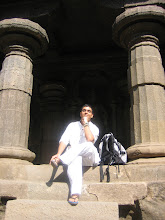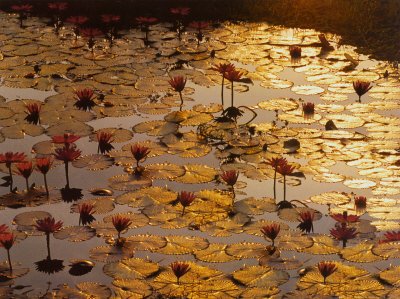
...So I had finally settled it, I was going to become a Buddhist and now needed to delve into the basics but there was just one trip up...2500 years and many diverse cultures means modern day practitioners, particularly in the West, have inherited TONS of traditions, practices, methods, and texts. Where in the hell was I to start?
A high school friend of mine came from a Cambodian background and since he was really the only "Buddhist" I knew personally, I asked him some basic questions about the kind of Buddhism his family practiced. I learned that they practiced in the Theravada tradition and that's the oldest extant tradition around. After doing some more digging around I decided I'd start studying Theravada for two reasons. First, because its the oldest tradition, I felt it might be closer to the "original teachings" of the Buddha; a superficial appeal was also that it still seemed "very Indian". Second, the Mahayana traditions just felt really weird to me. I barely knew anything about the actual teachings but I wanted to stay away from it because it just seemed more (please forgive me for this) theistic. I guess I had this idea looking at the flashy Tibetan stuff and the popular East Asian traditions, in particular what I would later come to know as Pure Land. Looking back now, I realize just how hilarious a misconception it was but hey, cut me some slack. Back then I couldn't tell you the difference between the Gandavyuha and a gandharva.
Thus it began. The two major sites I frequented were Access to Insight and BuddhaNet. In particular, essays by Ven. K. Sri Dhammananda and Ven. Bhikkhu Bodhi, a teacher I would have the great fortune to know personally, were exactly what I was looking for. The Noble Truths, Dependent Origination, and especially the life story of the Buddha became very familiar, very quickly.
After a period of intense reading and humorous experiments with meditation, I felt it was time for me "put myself out there" and find some kalyana mitras - spiritual friends. I found out that Stony Brook had an active student Buddhist group and it seemed worth checking out. When I walked into the first meeting, I felt a kind of...familiarity. Logically, it seemed totally bizarre since I had just met these people but I felt a good vibe. Eventually, the group stalwarts would become close friends. Soon, I found myself being chosen as president of the Buddhism Study and Practice Group (BSPG), a sometimes hectic but always fun and insightful experience.
In the middle of all this, I also began to broaden my own approach to Dharma, specifically to look at non-Theravada stuff. I figured that Mahayana teachings have been around for at least 2000 years...something has got to be appealing about it, right? Early in my studies, I resolved that instead of being a "nightstand Buddhist" and reading books about Buddhism, I wanted to read the source material, i.e. the sutras themselves. With this approach I figured I'd look at what was considered the most popular of the Mahayana sutras and perhaps all Buddhist sutras in general: The Heart Sutra.
I googled it and clicked on the first link (can't remember which site it was). My first impression was something like this: 'Avalokiteshvara'? Um ok...hey, my its man Shariputra!...'no ignorance and no ending of ignorance', what?...'no wisdom and no attainment'...what the $h1t?...'svaha'?, don't Hindus say that? Thoroughly perplexing indeed and it would take essentially all of the classes I took for my religious studies minor and lots of studying, practicing, reflections, and experiences before it made any sense. Now I consider the Heart Sutra to be truly be the heart of wisdom.
Getting back to exploring the Mahayana, one of the places I used to go to was the Tibet Center NYC. Many of the people at the BSPG practiced Tibetan Buddhism and we had speakers, like Lama Nicholas Vreeland, come out to give talks occaisionally. I was quite curious about it all but soon found that it wasn't my "cup of Dharma". Case in point: one day I show up for a 'Medicine Buddha Puja'. Ok sounds like fun. I get there and one of the other students is telling me how to perform the meditation. "Ok, the first thing you do" he said, "is to imagine the brilliant blue body of Medicine Buddha - Bhaisajye Guru sitting in a giant lotus. There are rays of light emanating from his crown and each ray represents [something]. Now imagine the mantra of medicine Buddha - "Om namo bhagawate Bhaishjaye guru
Late one Saturday night I was at home watching GI Joe on Cartoon Network and remembering long past days of my childhood. After Cobra Commander had come up with his big plan, the commercials came on and I decided to channel surf. After a few channels I saw something completely bizzare. An old Chinese monk sitting on the high seat (Dharma Teaching seat) talking about Chan meditation. The TV guide listing was "Chinese Spectacular Culture Bonanza" or something. I thought: whoa, who is this dude and why the hell is he on at like 2 am? Later I'd find out from my friends at Stony Brook that he's a Ch'an master named Sheng Yen and founder of the Dharma Drum Mountain/Chan Meditation Center. This experience piqued my interest in Ch'an/Zen.
A few months later on May 18th, 2003, I took refuge with Shifu Sheng Yen, receiving transmission of the Five Precepts and Three Refuges. I was given the Dharma name Chang Jing 總 純 - Always Pure. Here I was, a newly minted lay practitioner and although I was "officially" a Buddhist, my practice was just beginning to take shape...








No comments:
Post a Comment